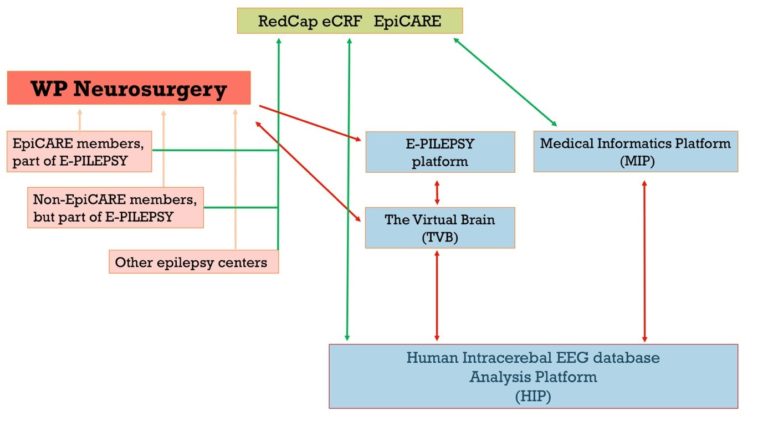E-pilepsy - Workpackage 8: surgery
The E-pilepsy pilot network of cooperation in epilepsy surgery
It has been operating since January 2014. It has provided a large number of deliverables and sustained activities that have been consolidated and further developed in EpiCARE. The network initially included 28 epilepsy surgery centres but has recently grown to 52 centres. While only some epilepsy centers offer comprehensive epilepsy care and can be labelled full members of EpiCARE, it is essential that the E-pilepsy pilot network of cooperation continues to expand and ensures optimal dissemination of information, guidelines, state-of-the-art methodologies and web-based tools which help increase the effectiveness and safety of pre-surgical evaluation and epilepsy surgery.
Epilepsy Surgery workpackage’s activities
– 1) Monthly E-Care visioconferences: These conferences, which allowed to discuss complex epilepsy surgical cases, have successfully continued under the coordination of Stefano Francione. Starting April 2021 this activity expanded to bi-monthly meetings (every 2nd and 4th Wednesday of the month from 4pm to 5H30pm CET) to increase the number of discussed surgical cases. The regularly updated agenda of EpiCARE Case discussions can be found here.
– 2) IT platform: The E-PILEPSY IT platform allowed each EpiCARE center to get access and use sophisticated neuroimaging and EEG postprocessing tools (e.g. Curry8). Maintenance includes supporting the data safety and data privacy requirements of the platform, including regular changes of each center password to access the platform via VPN (every 6 months). It will soon evolve into an expanded platform with additional functionalities, the Human Intracerebral EEG platform (HIP), thanks to the partnership established between EpiCARE and the Human Brain Project.
– 3) Epilepsy Surgery RedCap eCRF: This comprehensive eCRF aimed at collecting all relevant data from patients undergoing presurgical evaluation and epilepsy surgery. It is currently proposed to focus on patients undergoing invasive EEG recordings, but shall later expand to all patients considered for epilepsy surgery. Data can be entered on a local or central RedCap database. For those stored in their hospital of origin (local RedCap server), the Medical Informatics Platform (MIP), also developed within the framework of the Human Brain Project, can be used to federate the datasets without moving them away from their site of origin and storage.
– 4) The CogniEEG project: EpiCARE centers are core members of the CogniEEG project which aims at leveraging cognitive research performed in patients with epilepsy undergoing intracerebral EEG recordings (iEEG). Other iEEG centers from Europe, Asia and Oceania are also contributing to this project, which take advantage of the HIP platform and epilepsy surgery RedCap eCRF to collect, organise and analyse data.
– 5) The Registry: All data collected through the above activities (RedCap eCRF, CogniEEG and iEEG data in general) will feed the Epilepsy Surgery registry built to this purpose. The latter will communicate and cross-talk with the general EpiCARE registry, and will use the unique EUPID identifier for all EU patients.

Leaders


